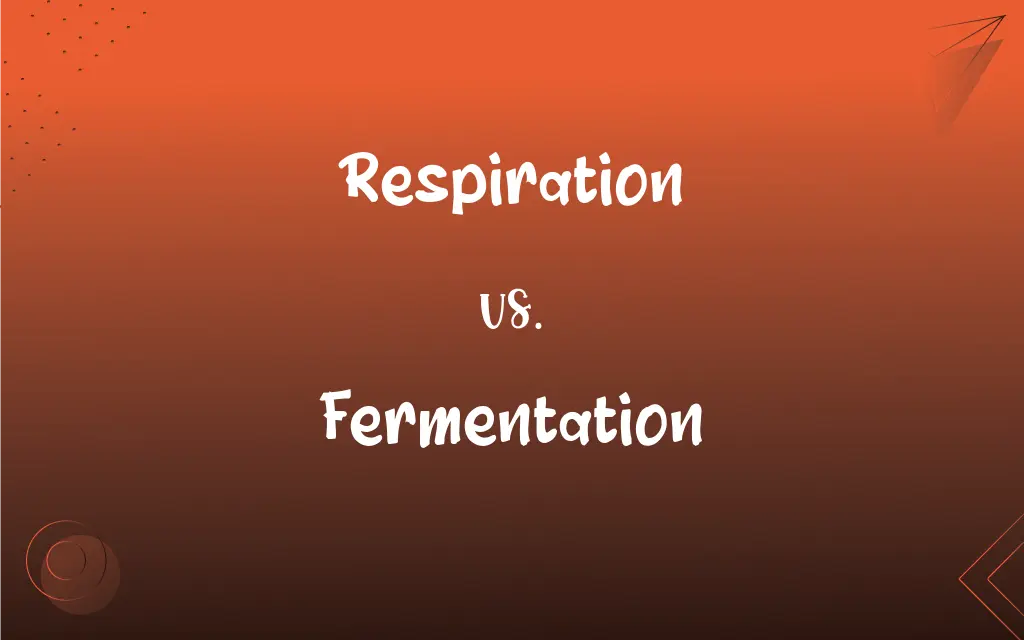Respiration vs. Fermentation: What's the Difference?
Edited by Aimie Carlson || By Harlon Moss || Updated on October 12, 2023
Respiration is a metabolic process where cells obtain energy by oxidizing nutrients and releasing carbon dioxide. Fermentation is an anaerobic process where energy is extracted from glucose without the involvement of oxygen, producing ethanol or lactate.

Key Differences
Respiration is fundamentally an energy-releasing process that is vital for nearly all forms of life, encompassing a wide range of biochemical mechanisms. Fermentation, on the other hand, is a specific form of metabolism that typically occurs under anaerobic conditions. These processes demonstrate distinct pathways in biochemistry, where respiration usually necessitates the presence of oxygen and fermentation thrives typically without it.
In respiration, cells extract energy from nutrients, often glucose, through a series of enzymatic reactions that entail the transfer of electrons and are usually associated with the production of carbon dioxide and water. Fermentation also initiates with glycolysis, breaking down glucose into pyruvate, but diverges by reducing pyruvate into various other compounds, like ethanol or lactic acid, without utilizing the electron transport chain, a hallmark of respiration.
Respiration invariably includes the electron transport chain, which is an organized array of proteins and coenzymes embedded in the membrane of mitochondria (or plasma membrane in prokaryotes), which actively drives the formation of the energy currency of cells, ATP. In stark contrast, fermentation circumvents the electron transport chain entirely, generating ATP solely through substrate-level phosphorylation during glycolysis, resulting in a comparatively lower yield of energy.
Respiration and fermentation can serve as complementary processes in some organisms. Under aerobic conditions, cells may prefer respiration due to its higher energy yield, whereas, under anaerobic conditions, they may shift to fermentation to maintain essential ATP production, even though it's less efficient. Here, respiration stands out for its efficiency while fermentation provides versatility under oxygen-limited environments.
Despite their differences, both respiration and fermentation are paramount in the energy metabolism of cells. Where respiration serves a majority of eukaryotic cells with a highly efficient method of generating energy, fermentation provides a crucial alternative for organisms, or certain conditions, where oxygen is scarce, affirming the adaptability and survival of life forms in varied habitats.
ADVERTISEMENT
Comparison Chart
Oxygen Dependency
Requires oxygen.
Does not require oxygen.
ATP Production
Produces more ATP (36-38 per glucose molecule).
Produces less ATP (2 per glucose molecule).
End Products
Produces CO2 and H2O.
Produces ethanol or lactic acid.
Location in Cell
Occurs in mitochondria.
Occurs in cytoplasm.
Electron Transport Chain Utilization
Involves electron transport chain.
Does not involve electron transport chain.
ADVERTISEMENT
Respiration and Fermentation Definitions
Respiration
Respiration is the biochemical process by which cells produce energy from nutrients.
The respiration in our cells enables us to utilize the energy stored in the food we eat.
Fermentation
Fermentation is a metabolic process that converts sugar to acids, gases, or alcohol.
The fermentation of grapes creates wine.
Respiration
In physiology, respiration also refers to the inhalation and exhalation of air in breathing.
Through respiration, our lungs exchange oxygen and carbon dioxide with the atmosphere.
Fermentation
Fermentation implies a state of agitation or turbulent change or development.
The city was in a state of political fermentation after the announcement of new policies.
Respiration
Respiration can denote the rate at which an organism breathes, measured in breaths per minute.
The doctor measured the patient's respiration to ensure it was within a normal range.
Fermentation
In cooking, fermentation refers to the process where food is exposed to bacteria and yeasts, either via inoculation or naturally through the air.
The fermentation of milk with specific bacteria produces yogurt.
Respiration
In a broader sense, respiration describes the exchange of gases across any membrane.
In plants, respiration includes absorbing carbon dioxide and releasing oxygen via stomata.
Fermentation
In a broader context, fermentation refers to the slow decomposition of organic substances.
The fermentation of the compost pile was evident due to the emerging heat.
Respiration
Respiration also indicates vocal expression or utterance in terms of speech quality.
The speaker’s calm respiration allowed for a clear and steady speech delivery.
Fermentation
In chemistry, fermentation denotes a reaction in which substances are broken down into simpler compounds.
Through fermentation, complex organic molecules are broken down under anaerobic conditions.
Respiration
The action or process of inhaling and exhaling; breathing. Also called ventilation.
Fermentation
Any of a group of chemical reactions induced by microorganisms or enzymes that split complex organic compounds into relatively simple substances, especially the anaerobic conversion of sugar to carbon dioxide and alcohol by yeast.
Respiration
An act of inhaling and exhaling; a breath.
Fermentation
Unrest; agitation.
FAQs
What are common products of fermentation in yeast?
Ethanol and carbon dioxide are common products of fermentation in yeast.
Is ATP produced in respiration?
Yes, ATP is produced in respiration and it's a significant energy source for cells.
What is the primary role of respiration in organisms?
Respiration provides energy for cellular activities by breaking down nutrients.
How does respiration support metabolic activities in cells?
Respiration generates ATP, which provides energy to drive various metabolic activities, including growth, repair, and maintenance within cells.
Why is oxygen crucial for aerobic respiration?
Oxygen serves as the final electron acceptor in the electron transport chain, allowing ATP production to occur efficiently in aerobic respiration.
What role does the mitochondrion play in respiration?
The mitochondrion hosts the electron transport chain and the citric acid cycle, which are crucial stages in aerobic respiration, helping in efficient ATP production.
Can fermentation be used to preserve foods?
Yes, fermentation can preserve foods by creating an environment unfavorable to spoilage microorganisms, enhancing shelf life.
How do organisms benefit from respiration?
Organisms benefit from respiration by obtaining the energy necessary for survival and function.
Can fermentation occur in human muscle cells?
Yes, fermentation can occur in human muscle cells, producing lactic acid during rapid exercise when oxygen is scarce.
Is yeast used in all types of fermentation?
No, yeast is commonly used in alcoholic fermentation but different microorganisms are used in other fermentation types, such as bacteria in yogurt production.
Is fermentation an aerobic or anaerobic process?
Fermentation is an anaerobic process.
Can respiration occur without oxygen?
Aerobic respiration cannot occur without oxygen, but anaerobic respiration can.
How is fermentation used in baking?
In baking, fermentation from yeast produces carbon dioxide, causing the dough to rise and become fluffy.
Is fermentation considered a sustainable practice in food production?
Yes, fermentation is often considered sustainable as it can enhance food preservation, reduce waste, and often doesn’t require energy-intensive inputs.
How are the processes of respiration and photosynthesis related?
Respiration and photosynthesis are interrelated; respiration uses oxygen to produce ATP and release carbon dioxide, while photosynthesis uses carbon dioxide and light to produce oxygen and glucose.
What is the primary difference between aerobic and anaerobic respiration?
Aerobic respiration requires oxygen and produces more ATP, while anaerobic respiration does not require oxygen and produces less ATP.
Why is fermentation important in food production?
Fermentation is crucial in food production to preserve, flavor, and enhance nutritional value.
What are some common foods made using fermentation?
Common foods made using fermentation include yogurt, sauerkraut, kimchi, beer, and sourdough bread.
Does fermentation always produce alcohol?
No, fermentation can produce different end products, such as lactic acid in lacto-fermentation or alcohol and carbon dioxide in alcoholic fermentation.
Does respiration only refer to cellular respiration in biological contexts?
No, respiration can also refer to the physical process of breathing, involving the inhalation and exhalation of air in organisms.
About Author
Written by
Harlon MossHarlon is a seasoned quality moderator and accomplished content writer for Difference Wiki. An alumnus of the prestigious University of California, he earned his degree in Computer Science. Leveraging his academic background, Harlon brings a meticulous and informed perspective to his work, ensuring content accuracy and excellence.
Edited by
Aimie CarlsonAimie Carlson, holding a master's degree in English literature, is a fervent English language enthusiast. She lends her writing talents to Difference Wiki, a prominent website that specializes in comparisons, offering readers insightful analyses that both captivate and inform.































































